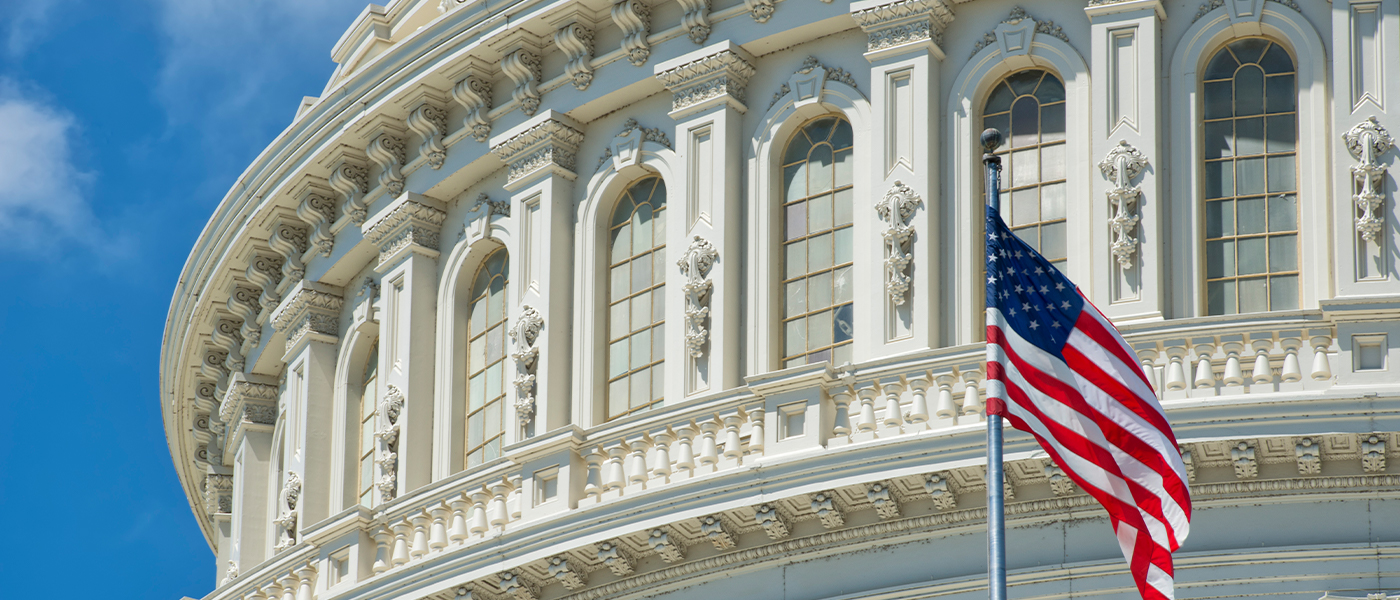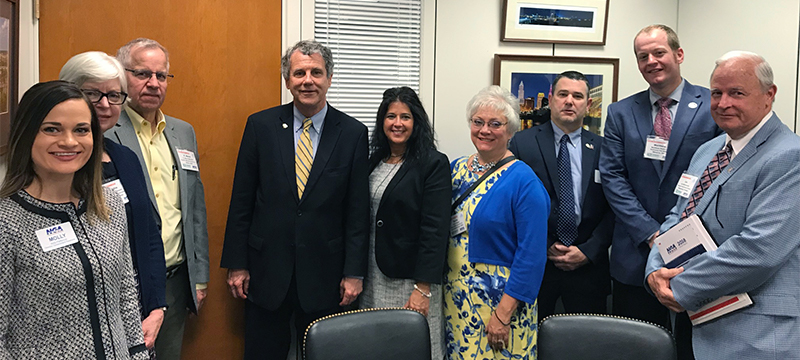Help Isom IGA recover from devasting floods

Independent grocers had the ears of elected officials recently, taking part in meetings with congressional representatives and their staff during the annual “Day in Washington” supermarket industry fly-in event.
Organized by the National Grocers Association (NGA) and Food Marketing Institute (FMI), the May 1 event saw independent retailers from across the country—including some IGA retailers—taking part in nearly 200 meetings with representatives in both political parties.
Terrie Baker, who with her husband owns four Baker’s IGA stores in Ohio, was one of the IGA retailers who participated. As an NGA board member, Baker has attended three of the past four "Day in Washington" fly-ins, and has additional years of advocacy experience at the state level.
IGA retailers Terrie Baker and Matt Kishman, met with Sen. Sherrod Brown (D).
“I’ve been in the grocery business for 40 years, every time I go to Washington, I’m just in awe. This year I walked from the Washington Monument to the Capitol and you see all these majestic buildings that are core elements of our country,” Baker said. “You may not like everything about our country, or the leaders and the decisions being made, but you still have the right to have a voice. If you don’t say it, who’s going to say it for you?”
Matt Kishman, store manager of Kishman’s IGA in Minerva, Ohio, who serves on the board of the Ohio Grocers Association agrees. “Connecting with legislators is important because they need to hear the voice of the independent retailers. At the end of the day it doesn’t matter if you meet with a Republican or Democrat, it’s about getting your point across and working together,” he said.
While there are many legislative items of importance to independent grocers, this year the dialogue with elected officials focused on two main issues.
Retail Glitch
The issue: Due to an unintended drafting error in last year’s tax bill, the tax burden on a category of business investments called Qualified Improvement Property (QIP) has been unintentionally increased. Now, interior improvements to stores such as refrigeration units, ceiling tiles, electrical wiring, and shelving depreciate over 39 years instead of immediately.
The solution: Bipartisan legislation has been introduced to fix the retail glitch. The Restoring Investment in Improvements Act (H.R. 1869/S. 803) was introduced in both the House and Senate and repairs the oversight without imposing any new costs on taxpayers.
The retailer perspective: According to Kishman, many retailers are holding off on making improvements until the tax issue is resolved. “If they don’t fix the glitch immediately, retailers have to delay on any improvements they want to make on their store,” he said.
What you can do: Contact your Representatives in DC and spread the word to raise awareness on the issue. Find more ways to get involved at http://www.nationalgrocers.org/fixtheglitch/.
Payment Security
The issue: The U.S. has the dubious distinction of being the world leader in credit card fraud, combined with high transaction fees (U.S. merchants pay almost $100 billion to process card payments every year), making credit card payments an expensive and sometimes unsecure operation. For grocery stores, with their extraordinarily tight profit margins, these burdens are costly.
The solution: In advocating for changes to the U.S. payments system, NGA and FMI have come up with a 4-prong approach that includes more competition in the payment-processor market, better options for user authentication, greater participation in the standard-setting process, and solutions that address online fraud.
The retailer perspective: This issue is a complex one, and the conversation is just beginning, said Baker, but it’s an important one to have. The big piece right now is educating legislators about the impacts processing fees and fraud have on independent retailers.
“They don’t understand that we work on one percent margin. When you have a fraud situation, retailers get hit with the chargeback. The representatives we spoke with did not know that,” she said.
Kishman agrees. “Payment fraud is a huge issue that impacts all retailers, who bear almost all the liability cost of card fraud and chargebacks. Congress needs to act on the credit card companies to make more secure payments like chip and PIN or biometrics (thumb/finger print). Congress also needs to act on reducing swipe fees. Major retail chains are able to negotiate on swipe but independent stores are stuck with high swipe fees,” he said.
Trip takeaways
For Baker, the trip to Washington is a reminder of how important it is to be there. “More grocers need to be involved,” she said. “This year was the smallest contingent we took from Ohio—only six people. Trying to cover all the representatives in Ohio, that was difficult.”
She credits NGA and FMI for all the preparation that went into the meetings beforehand. The trade groups held a webinar for participants to go over the issues, sent out information packets, and held a briefing over breakfast the morning of the event. “Conversations are only a half-hour tops, so it was helpful to have the talking points and information,” said Baker.
The biggest takeaway for Kishman this year—his fourth time attending—was meeting with Sen. Portman and Sen. Brown from Ohio in person. “Usually we meet with their chief of staff or another staff member. It feels good to actually meet face-to-face so you can get your point across better,” he said.
Other issues of importance for Kishman include WIC Reauthorization and the nationwide shortage of truck drivers. “We are in the process of setting up online shopping. It would be nice if customers could use their WIC benefits and EBT cards for online shopping,” he said. “And grocery stores rely on truck drivers to get products to our stores and on our shelves. If kids can go to trade schools for welding, plumbing, and electrical then they should be able to get training on driving a semi,” he said. The Drive-Safe Bill would help the shortage by lowering the age to get a commercial driver's license to 18 years old.
Both Baker and Kishman plan to continue to engage their representatives throughout the rest of the year, through store tours and other outreach methods.
Baker sums up the overall point to drive home: “If we don’t pay attention to family businesses like IGA, whether you are in a rural or urban area, some of these communities are at risk of becoming food deserts. They’ll be left with dollar stores and convenience stores and that’s going to be their only option,” she said.
Want to make sure your voice is heard?
NGA can work with you to plan and schedule a time for your member of congress to visit your store. Click here to learn more, or contact Channing Pejic, NGA coordinator, political & legislative affairs at cpejic@nationalgrocers.org.
No Comments Yet
Let us know what you think